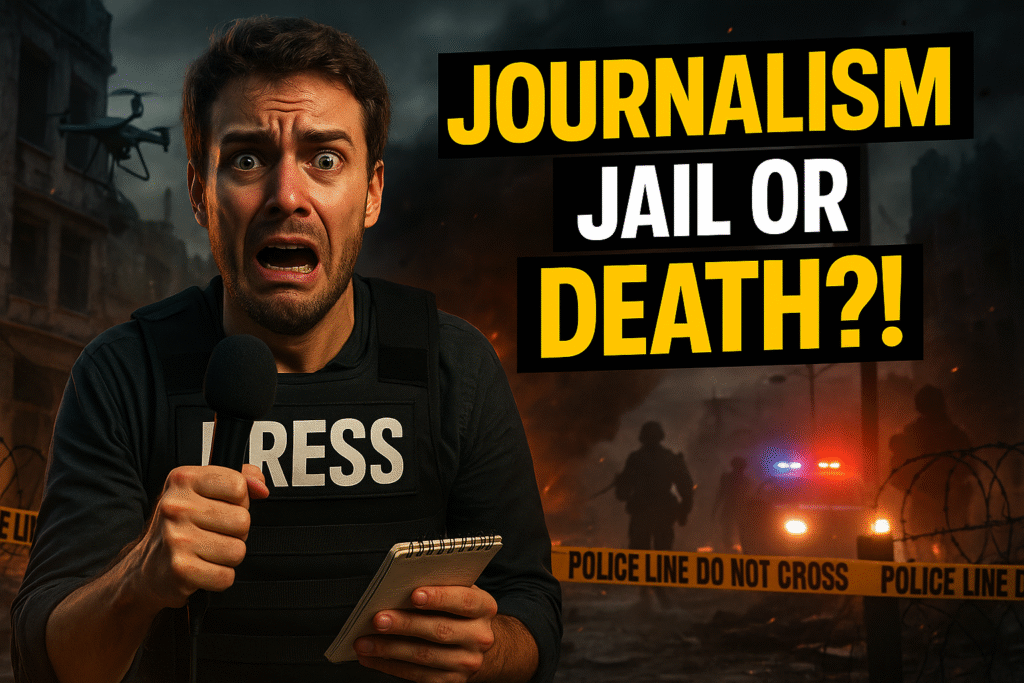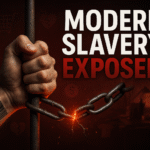We often think of journalism as a profession of speaking truth, asking tough questions, and reporting what’s happening around the world. But in many countries, being a journalist is more than just risky — it can be deadly.
You might imagine reporters covering wars and disasters are the only ones in danger. But the truth is, many journalists are threatened, attacked, jailed, or even killed simply for reporting the truth — even during peacetime.
Let’s take a closer look at why journalism has become so dangerous in some parts of the world, and which countries are the most dangerous for reporters today.
Why Is Journalism So Dangerous in Some Places?
Journalists are supposed to be protected under international law. The United Nations and many human rights groups say that freedom of the press is essential for democracy. However, some governments, criminal groups, or powerful individuals see independent journalism as a threat.
Here’s what journalists face in many countries:
- 🔫 Physical violence – Beatings, kidnappings, and even murder.
- 🚫 Censorship – Articles get banned, websites are blocked.
- 👮 Arrests and jail time – Journalists are charged with “spreading misinformation,” “anti-state activities,” or “terrorism.”
- 🕵️ Surveillance – Journalists’ phones are tapped and their online activity is monitored.
- 😨 Threats to family – Not just the reporter, but their families are also harassed or threatened.
Countries Where Journalism Can Be Deadly
Each year, organizations like Reporters Without Borders (RSF) and the Committee to Protect Journalists (CPJ) release rankings and reports about press freedom and journalist safety. Based on trusted 2024 data, here are some of the most dangerous countries for journalists today:
1. Mexico 🇲🇽
Mexico is the deadliest country for journalists in peacetime. Reporters who cover drug cartels, corruption, or police abuse are at extremely high risk. Since 2000, over 150 journalists have been killed, and many of these cases remain unsolved. Criminal groups often work with corrupt officials to silence journalists.
2. Russia 🇷🇺
In Russia, journalists critical of the government, especially President Putin or the Ukraine war, often face intimidation, jail, or mysterious deaths. Independent media outlets are banned or forced to close. The 2006 murder of reporter Anna Politkovskaya, who reported on human rights abuses in Chechnya, is just one of many tragic examples.
3. Iran 🇮🇷
Iran is one of the world’s top jailers of journalists. During political protests or unrest, journalists and bloggers are arrested, often without a fair trial. Many are accused of “spying” or “threatening national security,” and can face torture or long prison terms.
4. China 🇨🇳
In China, media is strictly controlled. Journalists who report on sensitive topics — like human rights, government corruption, or the situation in Xinjiang — face harassment, arrests, or disappearances. Foreign journalists also report being followed and restricted. The Chinese government uses high-level surveillance to watch media activity.
5. Afghanistan 🇦🇫
Since the Taliban regained control in 2021, press freedom in Afghanistan has collapsed. Dozens of journalists have been beaten, detained, or forced to flee the country. Women journalists, in particular, have been targeted and silenced.
6. Syria 🇸🇾
Syria has been one of the most dangerous countries for journalists for over a decade. Covering the civil war and reporting on war crimes often leads to abduction or death, especially from groups like ISIS. Many local journalists have been killed or forced into exile.
7. North Korea 🇰🇵
In North Korea, there is no free press at all. All media is state-run, and foreign journalists are banned or tightly controlled. Even possessing an outside newspaper or mobile footage can result in imprisonment or death for locals.
Other Countries with Serious Press Freedom Issues
- Turkey 🇹🇷 – Dozens of journalists have been jailed in recent years under anti-terror laws.
- India 🇮🇳 – Although it’s a democracy, attacks against journalists (especially those critical of the government) have increased. Online harassment and legal threats are common.
- Philippines 🇵🇭 – Journalists reporting on corruption or drugs have been murdered in broad daylight, and legal threats are often used to silence media voices.
What the Numbers Say (Trusted Sources)
- According to Reporters Without Borders (RSF) 2024 report:
- Over 550 journalists were imprisoned worldwide last year.
- More than 65 journalists were killed while doing their job.
- Nearly 400 media outlets were censored or shut down in just one year.
- The World Press Freedom Index 2024 ranked Eritrea, North Korea, Iran, and Syria among the worst countries for press freedom.
Why Does This Matter?
When journalists are silenced, the truth is hidden. Corruption, human rights abuse, and violence go unreported. People lose access to facts, and democracy begins to break down.
A free and safe press means:
- Corrupt leaders can be held accountable.
- People can make informed decisions.
- Injustices can be exposed and stopped.
That’s why defending journalists isn’t just about helping reporters — it’s about protecting freedom for everyone.
Final Thoughts 🕊️
Being a journalist should not be a death sentence. But in many countries today, telling the truth can cost your freedom — or your life. While some governments support press freedom, many others fear it and fight it.
It’s up to all of us — readers, citizens, and leaders — to stand up for the rights of journalists and demand a world where the truth can be told without fear.
📢 Because if truth dies, freedom follows.


